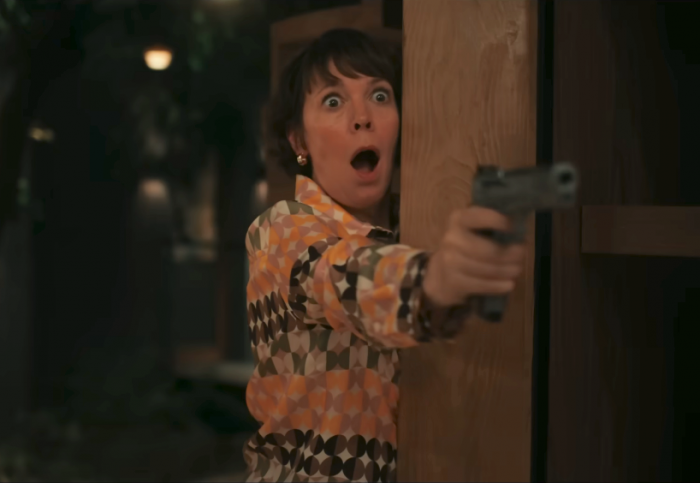By Tori Preston | Film | September 2, 2025

Before I get to the spoilers for the remake, let’s do a quick refresh on the 1989 film The War of The Roses, directed with lush flair by Danny DeVito. DeVito also starred as Gavin, a colleague of Oliver Rose (Michael Douglas) who acts as his divorce lawyer in his tumultuous separation from his wife, Barbara (Kathleen Turner). The film is framed as a cautionary tale Gavin recites to another would-be divorcee, with a simple message: Be generous, and get through the divorce as quickly as possible for your own sake, or go home and try to make it work. Otherwise, you might end up like Oliver and Barbara …
Though you may not know the extent of the tragedy unfolding, this frame makes you acutely aware from the start that the story will not have a happy ending. And perhaps because it’s told from Gavin’s perspective, we don’t know much about why the Roses fall apart. Oliver is a workaholic, Barbara is a homemaker, their kids are on their way to college, and one day Oliver suffers what he believes is a heart attack. The episode makes Oliver realize how much he loves his wife, but Barbara doesn’t bother to visit him in the hospital because she’s had her own realization: She’d be OK if he died. That night she asks for a divorce, and when Oliver pushes her for a reason, she refuses. “I can’t give you specifics,” she says. It’s on us to fill in the blanks, the creeping resentment that has settled into their marriage through a thousand tiny slights that went unaddressed.
With over an hour left in the runtime, the movie settles into the process of their divorce. At stake is the house they share, which Barbara found and decorated on Oliver’s dime. It’s all Barbara wants, and so it’s the one thing Oliver refuses to concede out of spite. So they sabotage each other, and the house itself, in a battle of wills that ends with them dangling from their crystal chandelier as it falls. In his final moments, Oliver reaches his hand out to touch Barbara, affirming once again that he still loves her. And Barbara musters the last of her strength to push his hand away, denying him reconciliation.
It’s a powerful image, this bitter end to the Roses, tangled in a broken chandelier on the tile of the foyer, and it is perhaps the most important moment that The Roses must reckon with in remaking the story. So: Do Theo and Ivy escape the tragic fate of their predecessors? Yes and no!
Theo and Ivy do die, though it happens offscreen. I’d be tempted to call it a cop out, except that what precedes it is so uniquely dark in its own way: They actually do reconcile. Like The War of the Roses, the final act finds Theo and Ivy trapped in their house as they battle over who will get it in the divorce. Theo wants it because he built it, but Ivy paid for it - and like Oliver, she can’t seem to accept that her partner wants to leave her. So they sabotage each other, and eventually outright attack each other using an assortment of cleverly laid Chekhov’s guns (some figurative, some literal), in an effort to get the other to give it up.
The difference is that there is no framing device warning viewers not to get attached to this couple, and with the bulk of the runtime devoted to their marriage rather than their divorce, it’s easy to get your hopes up that they just might work things out. What screenwriter Tony McNamara chose to do with The Roses was exactly what Barbara refused Oliver: He gets into the specifics. This is no gradual, unexplained breakdown of a loving relationship - we see a relationship survive a catalogue of petty conflicts and bruised egos because Theo and Ivy choose love over and over again, until they no longer are sure what they’re fighting to hold onto anymore. When they decide to separate, it isn’t because the marriage has been dead for years - it’s because they don’t have it in them to keep it alive anymore. If The Roses has a message, it’s that marriage takes constant work, and marriages end when that work no longer seems worth it.
Theo and Ivy did that work for years, and after hurting each other so deeply (and hilariously), they decide that maybe they can find it in themselves to put in more work after all. As propane leaks unseen from the kitchen stove Theo destroyed, the couple affirms they’re in this “till death do us part,” then share a kiss before telling their house AI to light the fireplace. In place of a kaboom, the film fades to white before the credits roll. I took this to be an accident, that Theo and Ivy truly thought they had a future together despite engineering the means of their own destruction, though I’ve heard other viewers who took the “till death” line as a sort of intentional suicide pact, that they knew about the gas leak and lit the fire anyway. Either way, they died as surely as Barbara and Oliver did, and though we don’t see their bodies in the fiery aftermath, there is something especially cruel about forcing the audience to not only imagine their deaths, but also imagine the future they could have had together.